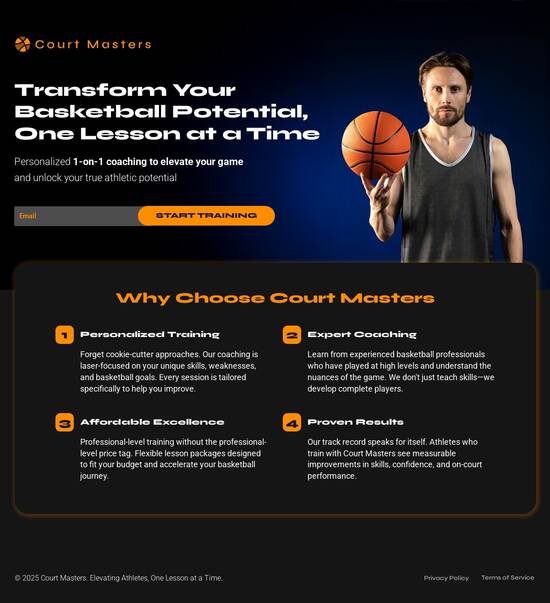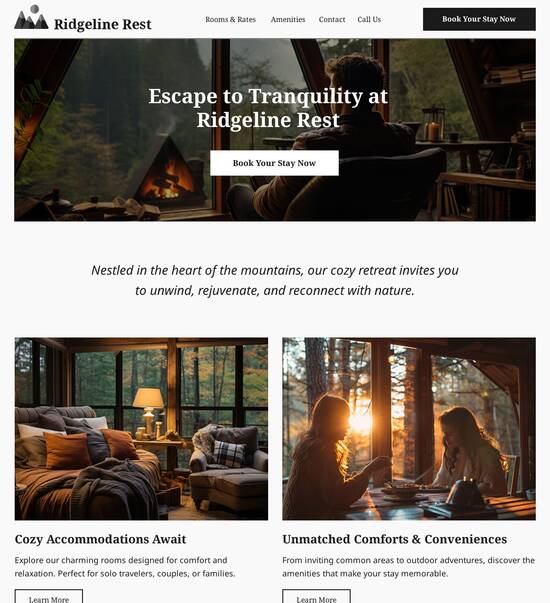
HTML page template for pay per click companies
Use TemplateAbout template
Give your pay per click companies a boost with our professional landing page templates. Ready to turn visitors into customers?
Recommended templates

Easy to build without coding
With the intuitive drag-and-drop builder, anyone on your team can create high-converting pages without any knowledge of code or design. Make enhancements to your landing page with custom widgets using Javascript, HTML/CSS, or third-party scripts.

Multiple layouts for any industry and goal
Select from 500+ landing page layouts built to boost conversions across industry-specific scenarios. Customize them by adjusting fonts, adding images, and generating on-brand content with the AI assistant. Quickly scale with Instablocks® and Global Blocks that you can save, reuse, and update globally.

Loads fast and looks polished on any device
Every template is responsive, which means they present professionally on any device and load blazingly fast with our Thor Render Engine. You can also power them up with Google AMP technology to deliver an unparalleled mobile experience and drive higher conversions.

Robust analytics & experimentation
Get real-time updates and reporting across all your devices, showing the number of visitors, conversions, cost-per-visitor, and cost-per-lead. Launch AI-powered experiments, run A/B tests, and use heatmaps to analyze user behavior, then optimize your landing page to maximize conversions.







Easy to build without coding
With the intuitive drag-and-drop builder, anyone on your team can create high-converting pages without any knowledge of code or design. Make enhancements to your landing page with custom widgets using Javascript, HTML/CSS, or third-party scripts.
Multiple layouts for any industry and goal
Select from 500+ landing page layouts built to boost conversions across industry-specific scenarios. Customize them by adjusting fonts, adding images, and generating on-brand content with the AI assistant. Quickly scale with Instablocks® and Global Blocks that you can save, reuse, and update globally.
Loads fast and looks polished on any device
Every template is responsive, which means they present professionally on any device and load blazingly fast with our Thor Render Engine.
Robust analytics & experimentation
Get real-time updates and reporting across all your devices, showing the number of visitors, conversions, cost-per-visitor, and cost-per-lead. Launch AI-powered experiments, run A/B tests, and use heatmaps to analyze user behavior, then optimize your landing page to maximize conversions.
All the features you need to build lead-generating landing pages
Explore more featuresLearn how to build top-performing landing pages for any goal
FAQs
Leading the way in building high-performing landing pages





A comprehensive guide to using Instapage for landing page optimization
Instapage is the most powerful landing page and conversion rate optimization (CRO) platform available today. It allows marketers to accelerate their campaigns, driving higher ROI with targeted strategies. In this guide, you'll discover how to utilize Instapage to maximize your landing page efficiency and drive conversions in various industry sectors, including business services and education.
Understanding the power of Instapage in digital marketing
Instapage provides an extensive library of over 100 customizable templates tailored for high conversion rates. This accessibility helps businesses and marketers quickly create effective landing pages and optimize their funnels, reducing the time spent on design and coding. By leveraging these templates, you can enhance your marketing efficiency right from the start.
- 100+ ready-to-use templates: Save time with pre-designed pages that align with your brand.
- Dynamic text replacement: Personalize content depending on visitor attributes.
- AdMaps: Seamlessly align specific ads to relevant landing pages to enhance targeting.
Step 1: Launching your landing page with Instapage
Begin your journey with Instapage by choosing a template that resonates with your campaign goals. This selection should reflect the specific requirements of your industry—be it tech, financial services, or government. Once selected, use the intuitive builders to customize the page as necessary, ensuring it captures leads effectively.
Step 2: Optimizing your landing page for maximum conversions
After launching your landing page, focus on optimization. Instapage's built-in experimentation features will allow you to conduct A/B tests to assess which elements perform better. Use heatmaps to identify user interactions and optimize layouts accordingly.
- Conduct A/B tests: Experiment with different headlines, call-to-action buttons, and layout designs to improve conversion rates.
- Utilize heatmaps: Analyze how visitors interact with your page and adjust visuals to capture attention.
- Monitor performance: Use the analytics dashboard to track conversions and refine strategies.
Step 3: Collaboration and feedback to enhance your design
Proper collaboration is key to refining your landing page over iterations. Instapage’s collaboration tools allow for real-time feedback and edits to improve designs based on input from team members and stakeholders.
- Instant feedback provision: Speed up the review processes to enhance efficiency.
- Real-time editing capabilities: Make changes and track adjustments in real-time.
- Secure sharing options: Share prototypes with stakeholders securely for constructive feedback.
By applying these steps, marketers can significantly enhance their digital marketing efforts using Instapage. The combination of powerful tools for optimization, personalization, and collaboration positions Instapage as a leader in landing page and CRO solutions.
Don’t miss out on transforming your marketing campaigns. Explore Instapage today and leverage its tools to maximize your return on investment (ROI).
People also ask about HTML page template for pay per click companies
HTML page template for pay-per-click companies
Understanding the unique needs of PPC companies
Pay-per-click (PPC) advertising is a crucial aspect of digital marketing, particularly for businesses looking to drive immediate traffic and conversions. Understanding the unique needs of PPC companies is fundamental to designing effective landing pages. One prevalent need is the requirement for specialized landing pages that are solely dedicated to converting visitors who arrive through ads. These pages must not only look visually appealing but also fulfill distinct objectives that tie back to the ad campaigns.
A key element in any PPC campaign is the landing page. These dedicated pages differ vastly from regular web pages in that they focus solely on a singular action, such as signing up for a newsletter or completing a purchase. Effective landing pages aim to streamline the conversion process, minimizing distractions that often exist on standard web pages. Therefore, it is essential to understand the characteristics that make these landing pages successful.
Importance of landing pages in PPC campaigns
Differences between standard web pages and landing pages
Essential features of an HTML page template for PPC
For PPC companies, having a well-structured HTML page template is crucial. An effective template includes pre-defined sections that enhance user experience and drive conversions. Key elements such as header and sub-header areas are essential for capturing attention right away. The content sections must highlight key benefits and features of your offering before leading visitors to a compelling Call to Action (CTA).
Incorporating images and multimedia can elevate engagement significantly. Visually appealing images evoke emotional responses, drawing users further into the content. Alongside images, video snippets can enrich storytelling aspects, making the offerings more relatable and engaging. Including image alt tags is not just a practice for SEO; it also enhances accessibility for those who rely on screen readers.
Pre-structured sections to enhance user experience
Image and multimedia integration
Layout and design considerations
Successful landing pages are recognized for their responsive design principles. It’s crucial that pages are mobile-friendly to accommodate the increasing number of visitors accessing sites on mobile devices. This entails reorganizing layout components for different screen sizes while ensuring that functionality remains intact. The emphasis on quick load times can’t be overstated either, as visitors will quickly abandon pages that take too long to appear.
A strong visual hierarchy is equally important for guiding the reader through the content. Structuring elements such as headlines, sub-headlines, and CTA buttons logically helps maintain user engagement. Scrutinizing the use of whitespace contributes to focus, allowing key pieces of content to stand out. Furthermore, selecting appropriate color schemes that resonate with brand identity and using easily readable fonts will make the browsing experience more enjoyable.
Responsive design principles
Visual hierarchy and content flow
Color schemes and typography
Crafting compelling messaging
The effectiveness of PPC landing pages is often tied to their messaging strategy. Crafting strong, value-driven headlines is the first step toward capturing interest. A compelling headline should not only draw attention but also outline what visitors will gain, ensuring immediate relevance to the ad that brought them there. Consider using techniques like numeration or posing questions to spark curiosity.
Beyond headlines, writing persuasive copy is essential. Finding the right balance between assertive yet authentic language keeps visitors engaged and encourages action. Incorporating storytelling techniques can establish a deeper connection with your audience, illustrating how your offerings address their specific pain points. Additionally, optimizing your CTAs for higher conversions involves experimenting with various types, placements, and languages.
Headline strategies for PPC landing pages
Writing engaging copy
Optimizing CTAs for higher conversions
The role of analytics in landing page optimization
Analytics play a pivotal role in refining landing pages for PPC companies. Tracking visitor engagement allows marketers to assess the effectiveness of their strategies and make data-driven decisions. Key metrics, such as bounce rate and time spent on the page, enable a comprehensive view of user behavior. Employing analytical tools will help marketers monitor how effectively a landing page converts visitors into leads.
After collecting data, identifying areas for improvement becomes the next task. Understanding the analytics can shed light on which elements work and which don’t, allowing for focused enhancements to maximize performance. Adjusting strategies based on the feedback provided by analytical observations is a practice that augments the overall effectiveness and relevance of landing pages.
Tracking visitor engagement
Identifying improvement areas
Practical examples and case studies
Examining successful PPC brands reveals effective landing page strategies that can serve as templates for other companies. Highlighting exemplary landing pages brings attention to unique elements that stand out and contribute to their conversion rates. These brands often showcase not just aesthetics but also the strategic integration of customer-centric designs that resonate with the audience, offering solutions tailored to their needs.
In contrast, understanding common mistakes can save time and resources. Many PPC campaigns falter due to poor landing page design or messaging that fails to align with user expectations. Learning from the shortcomings of less successful campaigns offers invaluable insights into pitfalls to avoid, guiding future efforts.
Successful PPC brands and their landing page strategies
Common mistakes to avoid
Future trends in PPC landing pages
As digital marketing continues to evolve, so too do the strategies behind PPC landing pages. Innovations in design and user experience, such as adaptive content that personalizes experiences based on user data, are gaining traction. This can significantly enhance engagement, as users appreciate content that feels tailored to their particular interests and needs.
Alongside design innovations, the integration of AI and automation into landing page creation is on the rise. Automated A/B testing enables faster iterations, while personalization powered by machine learning could optimize landing pages in real-time. Understanding these future possibilities is crucial for maintaining a competitive edge within the PPC landscape.
Innovations in design and user experience
Integration of AI and automation in landing page creation
Takeaways and action points for PPC companies
The journey towards building successful landing pages is anchored in understanding essential elements gleaned from the discussions above. By focusing on facilitating seamless user experiences and using data-driven decisions, PPC marketers can enhance their landing page performance. Each of the successful strategies mentioned can serve as a key takeaway for immediate use, allowing companies to bring improvement to their current campaigns.
More importantly, fostering a culture of continual learning and adaptation will keep PPC companies at the forefront of the industry. Marketers are encouraged to experiment with new ideas and stay updated on the latest trends and analytics techniques to refine their strategies continuously.
Essential elements for building successful landing pages
Continual learning and adaptation
Ready to skyrocket conversions?
Supercharge your ad campaigns with high-performing landing pages
Get started














